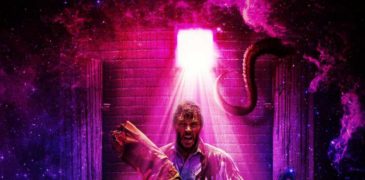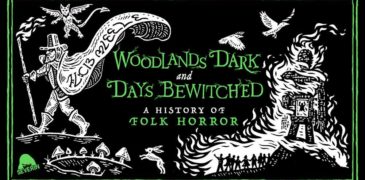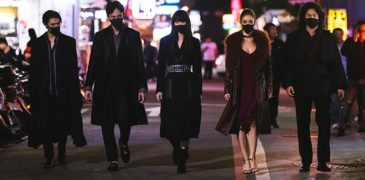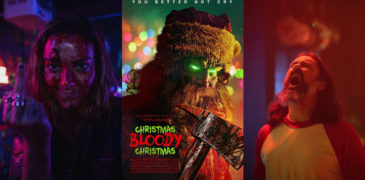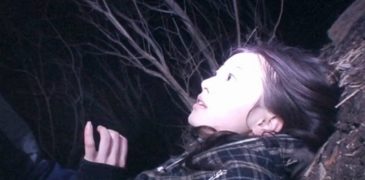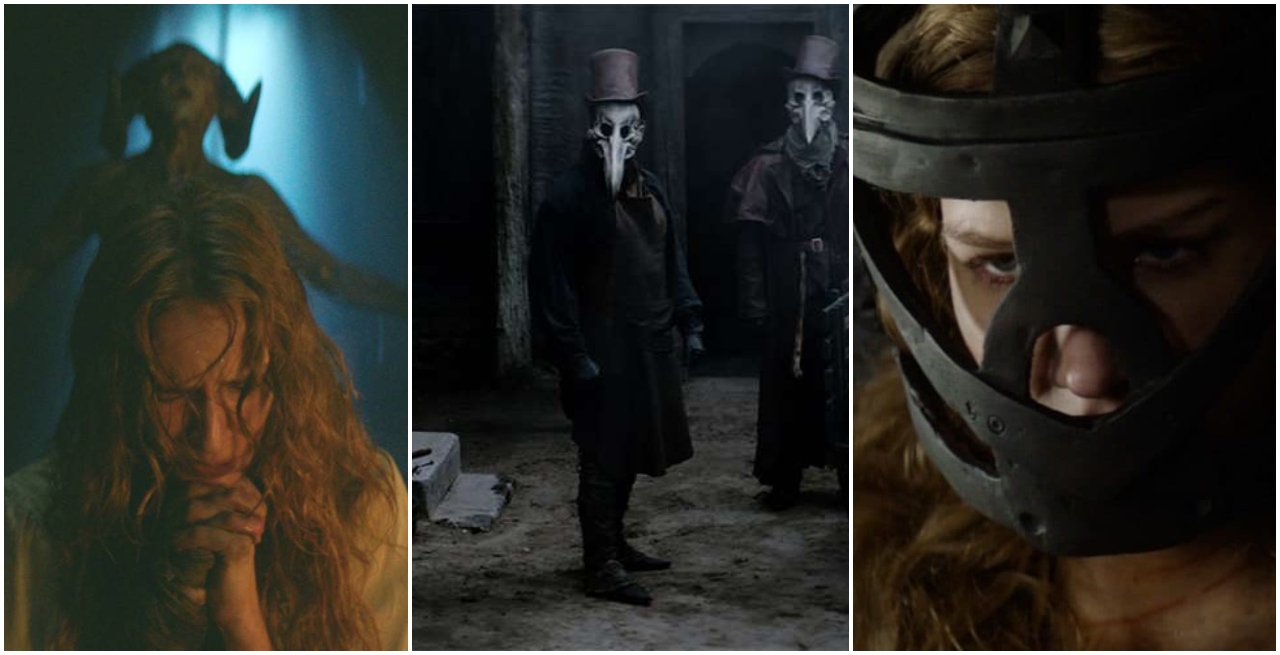
RevBarely a year after Neil Marshall’s first big-budget Hollywood feature, Hellboy (2019), failed to earn him a box office success, he has returned to his horror roots with the much anticipated The Reckoning. The failures and behind-the-scenes drama of Hellboy became pretty public as critics and viewers hung it out to dry and I was genuinely worried that we might have seen the very public, and very sad end to Neil Marshall’s career. With such a large-scale flop, few companies would be keen to back the release of any subsequent Marshall projects. I had heard about this title right after Hellboy released, but I was afraid that no one would distribute it. As a big fan of everything else he has done, I was super excited when I finally got a chance to see it thanks to an exclusive streaming deal with Shudder.
Director Neil Marshall has been somewhat of a holy figure in horror cinema since he tore onto the scene with his 2002 werewolf flick, Dog Soldiers. With a modest budget of two million dollars, it delighted gorehounds with copious amounts of blood, guts, and classic old-school practical werewolf effects. Just three short years later, Marshall crawled into the depths of claustrophobic horror with 2005’s The Descent. Sticking to a similar style of a small cast contained to just a few locations, and another solid helping of practical monster makeup, it seemed clear that Marshall had found his niche in the horror community. Unfortunately, his films never really recouped their money at the box office. They clearly broke even once all was said and done for the home video release or else Marshall would’ve never secured funding for any future projects. He went on to make two more Hollywood films with 2008’s Doomsday and 2010’s Centurion. While the former draws from many horror inspirations, the latter is a departure into gritty military history that still doesn’t shy away from the gore. Both films are a must-see if you are a fan of Marshall’s earlier films.
OK, but if all of Marshall’s films so far have been great, why did it take him nine years to make another feature film? I’m clearly not a Hollywood executive, because if I was….guys…we’d be seeing so many more creature features (check out our list of five best monster movies recently), but my guess would be that it came down to money. Marshall’s features were well received amongst horror fans and the video market, but they never really connected to a wider audience. Marshall wasn’t out though, as he went to direct a bunch of TV episodes for some popular shows like Black Sails, Hannibal, Lost in Space, and two of the best episodes of Game of Thrones: Blackwater and The Watchers on the Wall.
Marshall’s return to Hollywood came with the remake that no one really asked for: Hellboy (2019). While I could spend an entire day ranting about that utter disaster of a film, Marshall made it very clear in interviews that the Hellboy we saw was never his film, and was the product of excessive studio meddling. Marshall was very candid about being done with big studios and his desire to return to the glory days of lower-budget horror films.
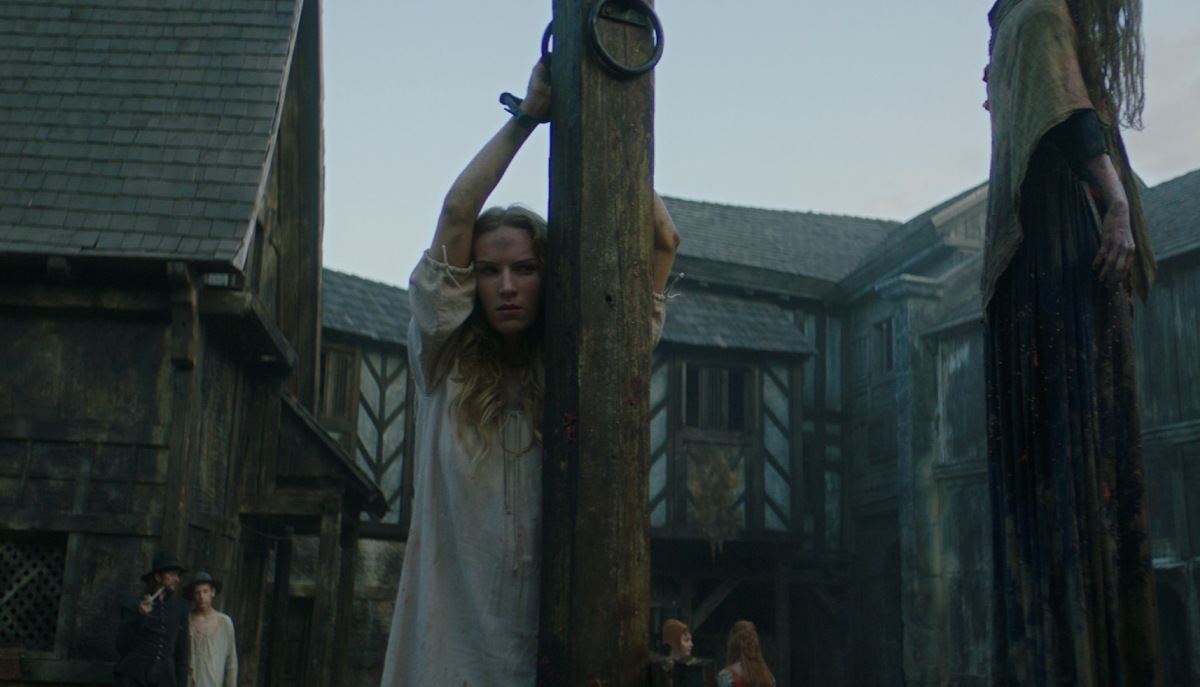
The Reckoning is a period film set in 1665 when the Plague is ravaging villages, and Witchfinders are traveling the countryside trying and burning suspected witches. As a young child, Grace Haverstock witnesses her mother being accused of witchcraft, and subsequently burned at the stake by Witchfinder John Moorcroft, played by Sean Pertwee (a regular for Marshall). The next scene of the film shows us an adult Grace (Charlotte Kirk) crying over her newborn child. Through a series of flashbacks, we learn that her husband was infected with the Plague while on a trip into town so that he could sell grain from their farmstead. Joseph Haverstock, vowing to protect Grace and their child, hangs himself to prevent his family from contracting the disease.
During Joseph’s visit to town, we get some exposition about the Haverstocks’ struggle to pay their duties to their landlord. Squire Pendleton (Steven Waddington) also makes it very clear that Joseph should keep an eye on his beautiful young wife. Waddington is coming on pretty strong in this role. He is trying to make it very clear that he is a villain, but to me, it just comes off as cheesy in a film that really hasn’t set up that tone. To be honest, that seems to be the case for most of the performances in this film. Some reviewers might call this bad acting, but personally, I would call it “campy” acting. Campy acting isn’t a bad thing at all if you have established the film as such, but The Reckoning isn’t a campy film. From the opening scene, the mood is dark and somber making me feel like there was some real weight to the material. Unfortunately, until Witchfinder Moorcroft enters the film, we will have to settle for some passable Monty Python impressions.
Soon after Joseph’s death, Squire Pendleton makes his presence known to Grace by visiting her cottage to remind her of the rent that is owed to him. His visit is a very thinly veiled attempt to woo Grace to be with him, but Pendleton is such an over-the-top prick that there is no way this is going to work. With his advances being met by heavy resistance, he falls back on bullying and threats letting Grace know that she has a very short time to come up with the money and that he will be back for it. Seriously, the guy is a dick.
Grace ends up selling their wedding bands in an attempt to garner enough money to keep Pendleton at bay, but even if she was able to raise the money we all know this wasn’t going to end well. Surprise! She didn’t get enough money, and Pendleton shows up to collect one way or another. In true villain fashion, Pendleton decides that he is going to take what he is owed for the land by attempting to sexually assault Grace. Did I mention that this guy is seriously a dick? Grace is able to fight him off with her late husband’s pistol, but now Pendleton is extremely angry and returns to town to lick his wounds and sulk. Back at the town pub, Pendleton, in his incel-like anger plants the suggestion that perhaps Grace is a witch. In a time of paranoia and imminent death, the suggestion of witchcraft is all it takes to damn someone to a horrible ending. This scene is very early in the film, and unfortunately, this is where things start to fall apart.
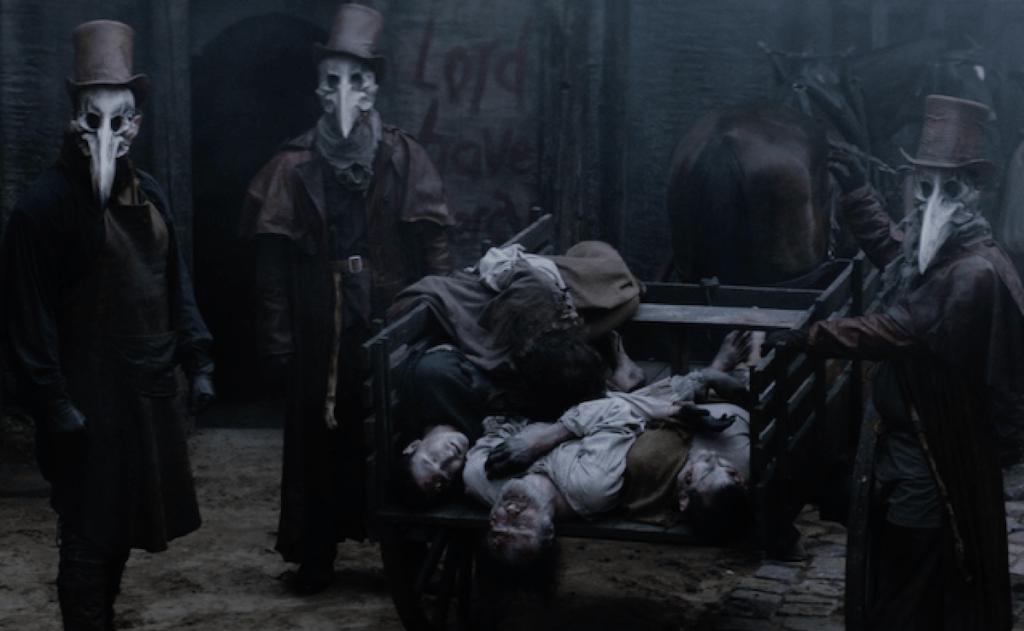
The townspeople suit up in their coolest plague doctor costumes to go to the farmstead and apprehend Grace. The images of the plague doctors were featured heavily in the marketing material for the movie, and they look great. It was a big sell of the film for me. Sadly, this is the only scene that they are in. After some struggling, Grace is apprehended and the plague doctor suits come off. At least they looked great while they were there? I was already feeling like this film might be confused about which direction it wants to go, but hey! It’s early on in the film and it hasn’t been terrible so far.
I listened to some promotional interviews with Marshall and Charlotte Kirk prior to the release of the film on Shudder and they both talked about the brutality of the scenes in which Grace is being tortured to elicit a guilty plea. Knowing from his previous works that Marshall isn’t afraid of gore, I was both curious and a little nervous about how the torture would play out. On one hand, I’m a gorehound and I worship at the altar of practical effects. On the other, I really don’t want to see the torture and persecution that was done to so many women played out as full period-accurate torture porn. Thankfully, Marshall handled this really well. Witchfinder Moorcroft takes his job very seriously, and he truly believes that he can root out evil through his faith…and torture…don’t forget the torture. Sean Pertwee actually plays Moorcroft with a ton of depth. He is stern and powerful, but I really bought the sympathy that he seems to have for Grace when trying to get her to confess to witchcraft. We all know what happened when someone was tried as a witch. There’s no getting out of it, and you are going to end up dead whether you were innocent or guilty. I never once got the feeling that Moorcroft delighted in the torture of his victims, which makes the coming scenes less torture-pornographic.
The second act of the film is a back and forth between Grace’s trial, and the time she spends waiting in her cell, but it almost feels like I am watching a completely different film. I’m not really surprised by the drastic shift in tone though, as Marshall’s Doomsday goes from Resident Evil to Mad Max to Excalibur in the span of two hours. But for Doomsday that worked. It was an over-the-top zombie film where anything was possible and that was established early on. The Reckoning, however, seemed to be confused as to which path it wants to take for the second act. At the start of each trial, Moorcroft makes a plea for Grace to confess so that she can be spared this torture and have a quick end to her life; potentially even a chance at forgiveness.
Each time Grace refuses his request and thus the torture ensues. Thankfully, these scenes aren’t so much about what Marshall chooses to show, but rather what he decides not to. Lingering shots of the torture devices and a slow build-up help mount the tension of the scene, only to cut away before it could ever be defined as gratuitous. You always know exactly what is happening to Grace, but I think Marshall made the right decision to not linger on it. After all, this stuff was real. Men committed these heinous torturous acts on thousands of women in the name of God and rooting out evil. There isn’t a need to celebrate it and I’m glad that Marshall felt this way too.
After each trial Grace is sent back to her prison cell to wallow in pain and to decide if her denial was truly worth it. This is done in hopes that she would confess the next day and it would all be over. In an act of kindness, Squire Pendleton’s servant boy (It felt weird to call him Squire’s squire, so I guess “servant boy” it is?) brings Grace food and encourages her to hold out strength for her daughter. This whole time, Grace’s daughter has been in the custody of Moorcroft, who is already planning to raise the child in the Church. Pendleton’s servant boy has been questioning the morality of everything he has seen since, having even tried to convince Pendleton not to sexually assault Grace at the beginning of the film.
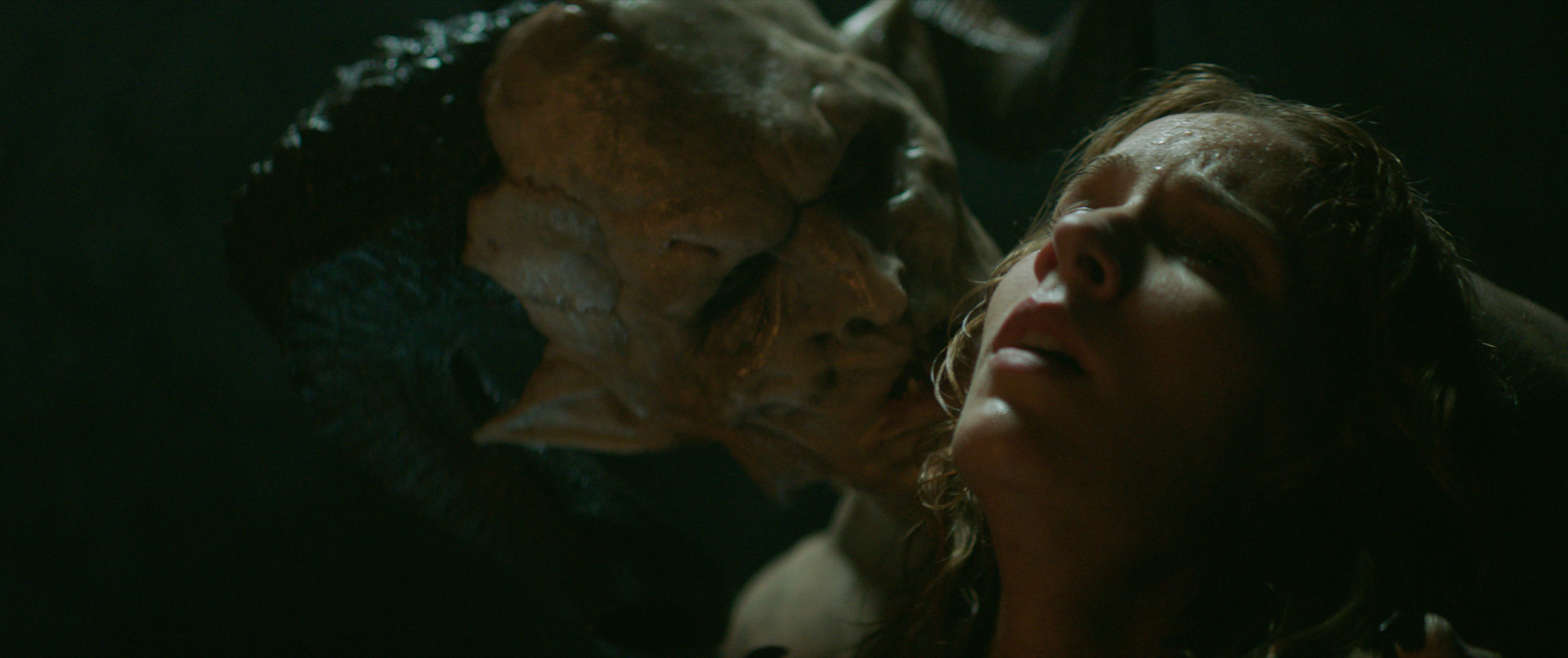
One of my favorite scenes takes place during a fever dream that Grace has during a night between torture sessions. It seems as though Grace is starting to break mentally because she is starting to hear voices and see images of Lucifer. The depiction of Lucifer is quite possibly the coolest thing about this film. A huge practical effects monster makeup demon appears in Grace’s cell to seduce her, and at this point in the film I was starting to think that maybe Marshall was going to take a different approach, actually having Grace commune with the Devil to save her and her baby. My hopes were dashed pretty quick as this actually just turned out to be a one-shot scene with some amazing effects. From the guy who started his career with some really impressive practical werewolves, I was disappointed to only see this fantastic makeup for just a few seconds of the film.
After a final test of torture using the infamous “pear of anguish”, a terrifying pear-shaped device that was designed to be inserted into an orifice and then “opened up,” Grace still refuses to admit guilt and is sent to her cell for one final night with orders to be burned at the stake the next day. With the help of Squire’s servant boy, Grace manages to escape her cell, dispatch the two drunk guards, and make her way through the castle to find her child. A huge part of enjoying horror films requires us to suspend disbelief and accept that people are capable of things that, in reality, would not be possible. I have no problem doing that, but in this case, I just felt it went too far. The “pear of anguish” is regarded as one of the most brutal torture devices in history, yet Grace is able to withstand it AND break out of her cell, AND dispatch two guards, AND sneak through the castle to find her baby. It was just too much for me. Maybe if Marshall had followed through and Grace had actually made a pact with Lucifer, then I could buy it, but that isn’t what happened.
When Grace finally makes it to her baby, she must confront Moorcroft in order to save her and tries to devise a scheme to poison his wine with the help of the servant boy. When Grace comes face to face with Moorcroft finally, she has the upper hand and Moorcroft feels compelled to bargain with her and insists they share a drink. Believing that the only way she can save her baby is to drink the poisoned wine, she takes a drink and then pins Moorcroft’s hand to the table with a dagger. It is only now, at the very end of the movie, that Grace reveals that Moorcroft burned her mother for witchcraft when Grace was a little girl and that all of this plot has seemingly been planned so that Grace can bring her “reckoning” to Moorcroft. By now, this movie has taken so many different paths in its storyline, that I’m not entirely sure there was ever a true plan, or merely just a series of “cool” ideas that would hopefully come together to make a feature-length film. Whatever the case, Grace traps Moorcroft in a burning room and is able to escape the castle through a well.
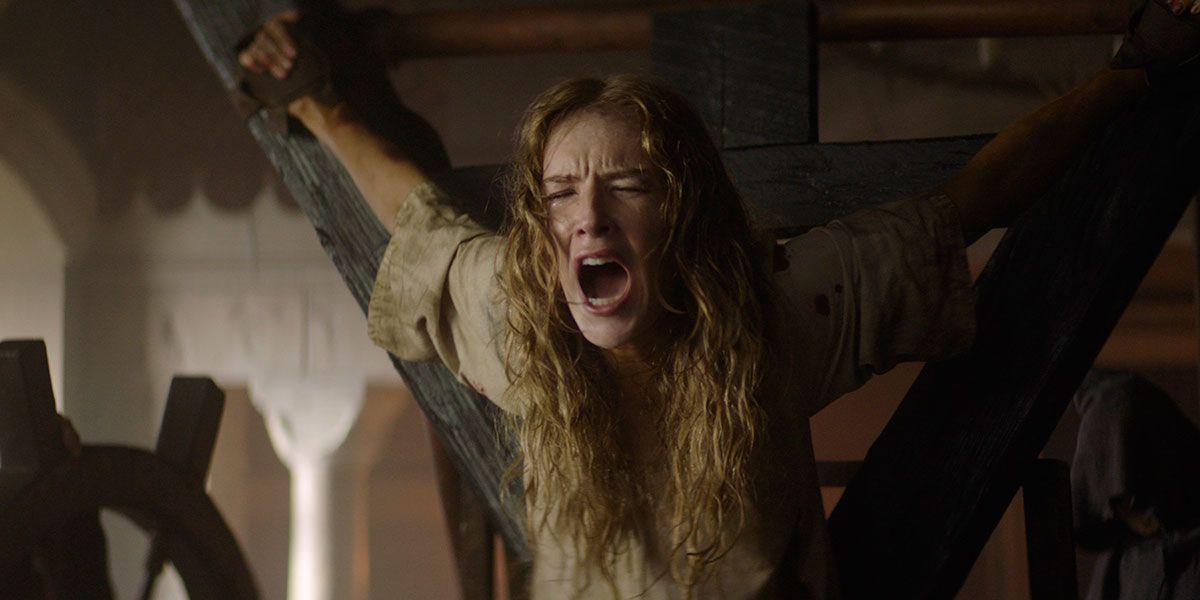
I love Neil Marshall. I think he is a genuinely talented director who has a great vision for how to tell a story and he has an amazing eye for directing hard-hitting action sequences, but The Reckoning just didn’t live up to what Marshall is capable of. Equally disappointing is that there aren’t a lot of films that delve into witch trials and even fewer that do it well. Films such as Witchfinder General (1968), Burn Witch Burn (1962), Cry of the Banshee (1970), and Mark of the Devil (1970) all deal with the subject matter of Witchfinders and witch trials, but focus more on the aspect of torture and exploitation. I was so excited to see a film about this subject matter in the hands of such a fun and capable director that I unintentionally set myself up for disappointment.
When it comes to recommending The Reckoning, I am really conflicted. The film suffers from questionable acting, a disjointed plot, and so many “almost’s” that it really is a disappointing movie, but that being said, I don’t think it is all bad. There isn’t a lot of gore in the film, but there are a few classic Marshall gags splattered throughout the movie. If you love works like Witchfinder General and Burn Witch Burn, or if you are just a big fan of Neil Marshall in general, you should definitely give The Reckoning a watch, but overall, I think this is a lesson that we sometimes need to temper our expectations when going into a film. I went in with such high hopes for a return to form from Marshall, and instead, I was just let down. That isn’t to say that I didn’t enjoy parts of the movie, but that being said, I think Marshall needs to have a reckoning of his own before he makes his next film.
More from Shudder:
Fresh off its world premiere at Fantasia and coming exclusively to Shudder this week, director Rebekah McKendry’s new film Glorious is a mildly amusing slice of cosmic horror that does… Explore the rural roots, occult creeds and cultural lore that continue to shape international cinema. The folk horror genre is as diverse as the countries, cultures, and eras in which… Many look to the upper echelons of society with a peculiar sense of awe, lives where money is no longer a concern is something that has drawn people into these… Christmas Bloody Christmas is an over-the-top slay ride of holiday cheer fear! Writer and director Joe Begos (VFW, Bliss) always delivers a combination of good storytelling and delirious, gory violence… I want the truth. No matter how terrifying. I want the truth. ~ Masafumi Kobayashi When I think about the genre of mockumentaries, the first image that comes to my… I honestly haven’t had this much “fun” while watching a horror movie in quite a long time. Shudder release Vicious Fun is true to the name; it carries immense nostalgic…Glorious (2022) Film Review – An Arterial Spray of Cosmic Horror
Woodlands Dark and Days Bewitched (2021) Documentary Review
Dead and Beautiful (2021) Film Review – The Decadent Undead
Christmas Bloody Christmas (2022) Film Review – An Over the Top Slay Ride of Holiday Fear
Noroi: The Curse (2005) Film Review: Into the Twilight Zone
Vicious Fun (2020) Film Review – An Aptly Titled Horror Comedy
